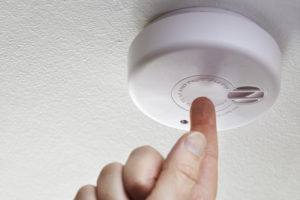Keep Your Home and Family Safe With These Ideas
At T.F. O’Brien, one of our top priorities is our customer’s comfort and safety. That’s why we strive to ensure your home comfort system is always working properly and operating safely. Because October is Fire Safety Month, we want to talk about ways you can help protect your home and your family against fires and carbon monoxide poisoning.
Having the proper devices in your home is crucial when it comes to your home safety. With modern technology, today’s home safety equipment is better than ever at detecting smoke, heat and carbon monoxide emissions. Learn more below about the three most important safety devices you can have in your home, with information provided by the National Fire Protection Association (NFPA).
Smoke Alarms
Smoke alarms, also often called smoke detectors, are the first line of defense if there ever is a fire in your home. When installed and maintained properly, they can play a vital role the reduction of fire and smoke related deaths and injuries. There should be smoke alarms installed on every level of your home, and in every bedroom and outside of sleeping areas. If you have battery operated smoke alarms, test them regularly, and replace batteries once a year. Additionally, you can purchase sealed alarms with long-life lithium batteries, or hardwired smoke alarms as well. If your smoke alarm sounds and you don’t know the immediate cause (like burnt toast), you should get out of the house and call your fire department.
Carbon Monoxide Detectors
Carbon monoxide (CO) is an odorless, colorless gas that at the very least cause serious illness, but can also cause death. There are a number of ways that CO can be emitted into the home, including heating and cooking equipment, vehicle emissions, and generators. You should ensure heating equipment and generators are regularly inspected to ensure their safe operation. Make sure to have a CO detector located in the same area as smoke alarms (you can install dual smoke/CO detectors), and make sure to test them regularly. If your CO detector sounds, leave your home immediately and call your local fire department right away.
Fire Extinguishers
Portable fire extinguishers can help save your home – and your life. They’re useful in putting out small fires. The NFPA indicates they may be used in situations where “the fire is confined to a small area, such as a wastebasket, and is not growing; everyone has exited the building; the fire department has been called or is being called; and the room is not filled with smoke.” Remember, fire extinguishers have expiration dates, too. Check yours to make sure they are not outdated. Keep a fire extinguisher in the garage, kitchen, and basement, or wherever you have equipment that could cause a fire.
For more information, please visit the NFPA website by clicking any of the links above or here. You can also call T.F. O’Brien at 516.488.1800 to make sure your home heating equipment is in good working order, and that your CO detectors are properly installed.

